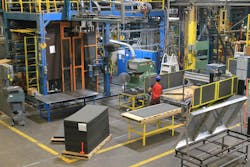Plastics processors express relief after Supreme Court nixes vaccine mandate
By Karen Hanna
The Supreme Court’s decision Jan. 13 to strike down a federal rule mandating COVID-19 vaccines for workers had some executives at plastics processing plants breathing a sigh of relief the following day.
“As a business person, we don’t take sides in politics. We care about business; we care about our people and we abide by the law in every country where we operate. In our plants, we have people that are strongly in favor of getting vaccinated and we have people that are strongly against. We treat everyone equally and do not discriminate,” said Stephane Vedie, CEO at the Luxit Group, a Farmington Hills, Mich.-based family of Tier 1 and Tier 2 suppliers of automotive components, including lighting components.
On Jan. 13, the court rejected an Occupational Safety and Health Administration (OSHA) rule proposed by President Joe Biden that would have forced large businesses to ensure their employees were either vaccinated or subjected to testing. At the same time, it preserved a separate rule dealing with health-care workers in facilities that receive Medicare and Medicaid funds.
With about 195 workers, Confer Plastics Inc. in North Tonawanda, N.Y., would have met the government’s working definition of “large” — 100 or more employees. President Bob Confer is won’t go into effect.
He noted people have many reasons for not wishing to be vaccinated, including religious objections.
“We are quite pleased with this decision,” Confer said of the court’s ruling on the mandate. “Had it gone through, it would have led us to conduct weekly testing of dozens of healthy workers for no good reason. … The court’s decision allows us to continue to do what we’ve done. That is, provide a safe and welcoming workplace for the vaccinated and unvaccinated alike.”
While studies have shown that both vaccinated and unvaccinated people can acquire COVID-19, hospitals report unvaccinated patients are at much greater risk for serious complications and even death. According to the Mayo Clinic, “it appears that vaccinated people spread COVID-19 for a shorter period than do unvaccinated people.”
Vedie and Confer said their companies have worked to protect all their workers all along.
According to its website, Confer Plastics began formulating its response to COVID-19 in January 2020 — before shutdowns became commonplace in the U.S.
“Since Day 1, we’ve had a full-time COVID administrator and we provide the tools and culture to succeed — masks, as-needed testing, case management and more,” Confer said. “We had inventoried plenty of tests in the event this rule made it through the court and to prepare,” in the event of a winter surge in COVID cases.
“We redirected those tests to the omicron wave, ensuring that we can provide our coworkers the peace of mind they and their families need while making sure our supply chain is safe and intact.”
In talking about the court’s decision, business continuity was top of mind for Vedie, too.
“The fact that the mandate was stopped was a relief for us because it was making things more complicated, the discussion more heated. We respect each other, we protect each other by already wearing masks in our factories. And the big risk was that some of the people would have decided to leave us, and it’s difficult to find good employees right now. It’s difficult to find good direct workers for a factory, so we would have a serious problem to find a replacement."
Though some employers have voiced similar concerns about staffing, employment and human-resources specialists say they have already seen companies move forward with their own mandates, and some are providing incentives to get vaccinated.
Karen Hanna, associate editor
